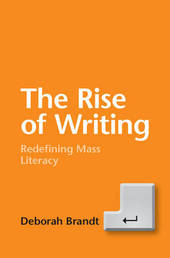
|
The Rise of Writing: Redefining Mass Literacy
Hardback
Main Details
| Title |
The Rise of Writing: Redefining Mass Literacy
|
| Authors and Contributors |
By (author) Deborah Brandt
|
| Physical Properties |
| Format:Hardback | | Pages:206 | | Dimensions(mm): Height 235,Width 156 |
|
| Category/Genre | Sociolinguistics |
|---|
| ISBN/Barcode |
9781107090316
|
| Classifications | Dewey:302.22440973 |
|---|
| Audience | | Professional & Vocational | |
|---|
| Illustrations |
2 Tables, black and white
|
|
Publishing Details |
| Publisher |
Cambridge University Press
|
| Imprint |
Cambridge University Press
|
| Publication Date |
8 January 2015 |
| Publication Country |
United Kingdom
|
Description
Millions of Americans routinely spend half their working day or more with their hands on keyboards and their minds on audiences - writing so much, in fact, that they have less time and appetite for reading. In this highly anticipated sequel to her award-winning Literacy in American Lives, Deborah Brandt moves beyond laments about the decline of reading to focus on the rise of writing. What happens when writing overtakes reading as the basis of people's daily literate experience? How does a societal shift toward writing affect the ways that people develop their literacy and understand its value? Drawing on recent interviews with people who write every day, Brandt explores this major turn in the development of mass literacy and examines the serious challenges it poses for America's educational mission and civic health.
Author Biography
Deborah Brandt is Professor Emerita of English at the University of Wisconsin, Madison.
Reviews'Based on seven years of interviewing people in workplaces, for the state, and as authors this remarkable book makes strong claims about the growing significance of writing. I was drawn into it from the first page of the introduction and just wanted to read on all the time.' David Barton, Lancaster University 'Through fascinating case studies that range from veteran ghostwriters to aspiring young authors, Deborah Brandt documents a significant trend: many of us now spend much of our daily lives composing texts. In such a world, she cogently argues, literacy research and teaching should focus on more than just skills of reading. With her usual acumen, rigor and eloquence, she calls for expanded attention to our new society of writing. She herself helps us understand it and think about how it might flourish.' John Schilb, Indiana University
|